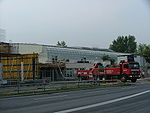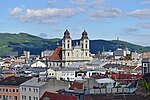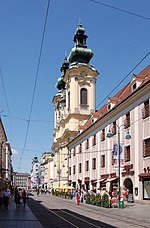Donauparkstadion
Buildings and structures in LinzFC Blau-Weiß LinzFootball venues in AustriaSports venues in Upper Austria

Donauparkstadion, commonly known as Hofmann Personal Stadion for sponsorship reasons, is a stadium in Lustenau, a quarter of the city of Linz, Austria. It is currently used for football matches and is the home ground of Blau-Weiß Linz. The stadium holds 5,000 people from 2023–24 after renovation.
Excerpt from the Wikipedia article Donauparkstadion (License: CC BY-SA 3.0, Authors, Images).Donauparkstadion
Straßerau, Linz Kaplanhof
Geographical coordinates (GPS) Address Website Nearby Places Show on map
Geographical coordinates (GPS)
| Latitude | Longitude |
|---|---|
| N 48.316371 ° | E 14.298862 ° |
Address
Hofmann Personal Stadion (Donauparkstadion)
Straßerau
4020 Linz, Kaplanhof
Upper Austria, Austria
Open on Google Maps











